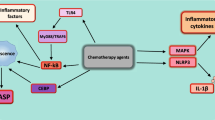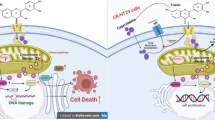Abstract
Quinine, the widely used antimalaria agent, was found to increase the cytotoxicity of epideoxorubicin (epiDXR) in resistant DHD/K12 rat colon cancer cells in vitro. Quinine appeared as slightly less effective than quinidine or verapamil for anthracycline potentiation but its weaker cardiotoxicity could counterbalance this disadvantage in vivo. Serum from six patients treated by conventional doses of quinine (25-30 mg kg-1 day-1) was demonstrated to enhance the accumulation of epiDXR in DHD/K12 cells as judged by fluorescence microscopy and HPLC assay (1.6 to 6-fold compared with control serum). In this patients quinine concentrations in serum ranged from 4.4 to 10.1 micrograms ml-1. Our results suggest that quinine could be safely used as anthracycline resistance modifier in clinical practice.
Similar content being viewed by others
Author information
Authors and Affiliations
Rights and permissions
About this article
Cite this article
Chauffert, B., Pelletier, H., Corda, C. et al. Potential usefulness of quinine to circumvent the anthracycline resistance in clinical practice. Br J Cancer 62, 395–397 (1990). https://doi.org/10.1038/bjc.1990.305
Issue Date:
DOI: https://doi.org/10.1038/bjc.1990.305
- Springer Nature Limited
This article is cited by
-
Phase I study of cinchonine, a multidrug resistance reversing agent, combined with the CHVP regimen in relapsed and refractory lymphoproliferative syndromes
Leukemia (2000)
-
Use of multiple drug resistance modifiers to overcome tumor resistance to cytostatics in anin vivo system
Bulletin of Experimental Biology and Medicine (1996)




